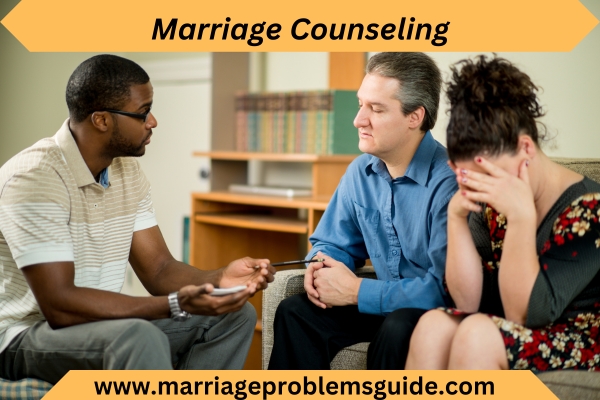Marriage Counseling
Marriage can be one of the most fulfilling relationships in life. However, it also comes with its fair share of conflicts and disagreements.
Unresolved marital issues can slowly chip away at the foundation of a marriage, leading to resentment, lack of intimacy, and sometimes, divorce. This is where marriage counseling can help couples work through their problems in a constructive manner.
In this article, we will explore the benefits of marriage counseling, the common causes of marital conflicts, effective counseling techniques, tips for choosing the right counselor, and advice on making counseling work for your marriage.
Benefits of Marriage Counseling
Marriage counseling provides several important advantages that can help couples overcome issues in their relationship:
1 Provides a safe space: One of the most valuable aspects of marriage counseling is that it offers a neutral and judgment-free environment for couples to openly communicate.
Within the counselor’s office, partners can express their feelings, needs, and opinions without fear of retaliation or criticism. This allows them to be vulnerable and authentic with each other.
2. Teaches conflict resolution skills: Counselors equip couples with healthy conflict resolution techniques like active listening, using “I” statements, compromising, and managing anger productively.
Learning these skills can help couples argue in a constructive manner and reach solutions that satisfy both spouses.
3. Improves intimacy and connection: Resolving conflicts through joint counseling removes roadblocks to intimacy and affection between partners. Partners feel closer and more connected when they are no longer fighting. Counseling facilitates understanding and respect.
4. Prevents divorce: By addressing issues in the early stages before irreparable damage is done, counseling can steer couples away from divorce. Counselors help couples preserve their marriage by making them aware of unhealthy patterns and guiding them to communicate and behave in ways that foster love.
5. Enhances overall well-being: When marital problems are addressed in a healthy manner, it relieves stress, improves self-esteem, and enhances overall life satisfaction for both partners. Counseling allows spouses to enjoy the emotional support and fulfillment a marriage provides.

Common Causes of Marital Conflicts
In order to resolve marital conflicts through counseling, it is important to first identify the sources of discord in the relationship:
- Money problems: Conflicting attitudes towards spending, budgeting, and financial goals often create tension between spouses and lead to arguments over money.
- Intimacy issues: Sexual problems, mismatched sex drives, or lack of an emotional connection can strain the intimacy in a marriage. This builds resentment between partners.
- Parenting disagreements: Different approaches to parenting and disciplining children is a common issue couples argue about, especially new parents.
- Lack of communication: Failure to communicate needs, expectations and feelings creates misunderstandings and distance between partners. This needs to be addressed.
- Work stress: Demanding jobs, odd work hours, juggling careers and family responsibilities can introduce stress that spills over into the marriage.
- Infidelity: Extramarital affairs deeply rupture the bond of trust between spouses leading to insecurity and jealousy. These need therapeutic intervention.
- Intrusive in-laws: When extended family members meddle excessively in the marriage, it can aggravate pre-existing issues between the couple.
- Mental health issues: When depression, anxiety, trauma, or other mental health problems impact one or both partners, it disrupts relationship dynamics.
- Addiction problems: Addictions make it impossible to have a healthy relationship, unless the addiction is treated through counseling.
- Major life changes: Transition periods after childbirth, relocation, and new jobs significantly alter relationships and can be challenging if partners struggle to adjust.

Techniques Used in Marriage Counseling
Marriage counselors use various techniques and therapeutic approaches to help couples improve their relationship:
- Active listening – This involves each partner attentively listening without interrupting when the other is speaking. They then paraphrase what they heard to demonstrate understanding. This builds empathy.
- Emotion coaching – The counselor helps couples identify the actual emotions beneath their conflicts and express them in a healthy manner. This improves communication.
- Insight building – Through exercises, the counselor assists couples in gaining insight into their own motivations and patterns as well as those of their partner. This promotes self-awareness and understanding.
- Cognitive restructuring – The counselor helps couples identify and challenge irrational, unhealthy thought patterns that contribute to conflicts. More realistic perspectives are developed.
- Conflict resolution – Couples are taught compromise, negotiation skills, and techniques to manage disagreements, arguments, and fights in a positive manner.
- Intimacy exercises – Couples engage in meaningful structured activities designed to foster trust, affection, and emotional/physical intimacy.
- Recovery techniques – For issues like addiction or infidelity, counselors provide a recovery process to support the couple in healing and rebuilding their relationship.

Choosing the Right Marriage Counselor
To select an effective marriage counselor, consider the following:
- Relevant expertise – Look for a counselor extensively experienced in marital/couples therapy specifically. Avoid ones who specialize in other areas.
- Individual compatibility – Make sure the counselor’s personality, values, and counseling style work well for both you and your spouse.
- Background – Examine the therapist’s qualifications, training, experience, treatment approaches, fees, and specializations to determine if they are a good fit.
- Logistics – Opt for a counselor you can conveniently meet at a suitable location, date, and time. Consider accessibility.
- Budget – Find affordable options based on your income and insurance coverage, like community family counseling centers.
- Comfort level – Ensure you and partner feel at ease opening up to and trusting the counselor. A good counselor-couple fit is important.
Making Marriage Counseling Work
To optimize marriage counseling benefits, follow these tips:
- Commit fully – Attend all sessions with an open mind. Make your marriage a priority.
- Identify patterns – Note down your conflicts, communication gaps, triggers etc. to gain insights and discuss patterns.
- Follow guidance – Comply with assignments, exercises, and techniques suggested by the counselor.
- Be patient – Improving marriage issues takes time and consistent effort. Don’t expect overnight results.
- Practice new skills – Consciously apply communication and conflict resolution methods learned in counseling.
- Don’t rush intimacy – Focus first on emotional intimacy before reintroducing physical intimacy.
- Manage expectations – Progress will be gradual so keep realistic expectations of the counseling process.
- Customize counseling – Provide feedback to the counselor if certain techniques seem ineffective for you.
Conclusion
If you are experiencing serious issues in your marriage, don’t hesitate to seek professional guidance. A qualified marriage counselor can equip you with the skills to address conflicts constructively before they destroy your marriage.
With compassion, hard work, and persistence, most marital problems can be resolved through counseling. Learn here more about marriage conflict counseling tips and guides.


